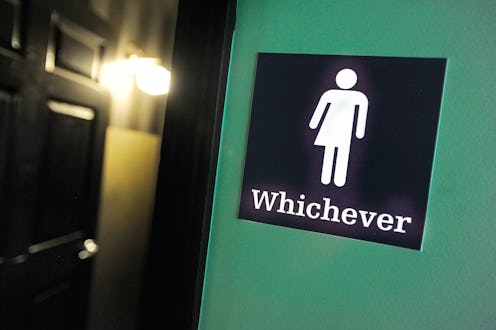News
Restrictive School Bathroom Policies Put Trans Teens At Higher Risk Of Sexual Assault

The results of a recent study suggest that restrictive bathroom policies put transgender teens at a higher risk of sexual assault. Specifically, a research team looked at the results of a 2017 LGBTQ Teen Study, and found that transgender and nonbinary students were more likely to experience sexual assault if they didn't have access to restrooms that matched their gender identity. The numbers are a stark call to action, given how many communities keep restroom and locker room access "restricted" to the gender identity people are assigned when they're born.
The study was carried out in the form of an anonymous survey, called the 2017 LGBTQ Teen Study, which polled 3,673 transgender and nonbinary teenagers from seventh to 12th grade. According to The Advocate, the results show that over a 12 month period, 25.9% of students who participated in the survey experienced sexual assault. Among those who had restricted access to the restroom and locker rooms that matched their gender identity, 36% reported sexual assault. Put another way, that means over one in three transgender students with restricted bathroom access reported experiencing sexual assault.
The four authors (Gabriel R. Murchison, Madina Agénor, Sari L. Reisner, Ryan J. Watson) concluded, "Pediatricians should be aware that sexual assault is highly prevalent in transgender and nonbinary youth and that restrictive school restroom and locker room policies may be associated with risk."
To CNN, Murchison said, "Unfortunately, kids' access to restrooms and locker rooms has become very politicized in some communities." He further clarified that the results of the study did not allow his team to make a definitive conclusion as to whether the sexual assault actually took place within restrooms and locker rooms. "But they are certainly a strong indicator of environments where kids are at risk," he said.
Murchison also suggested a strategy for schools looking to decrease this shockingly high rate of sexual assault: ask the students directly where the "hot spots" for assault are. He said to CNN, "At some schools, bathrooms and locker rooms may be the biggest issue, but at other schools it may be something different. Students may also be able to identify 'hot spots' for harassment and violence within the school building that need to be more closely supervised."
Per Reuters, the researchers also noted another apparent shortcoming in the design of the study: it didn't include enough black and Hispanic students, so they weren't able to make any conclusions on the extent to which race played a role in rates of sexual assault for transgender and nonbinary students. But it's not just rates of sexual assault that researchers and experts alike are worried about. In an editorial connected to the study, Dr. Stephen Rosenthal and Diane Ehrensaft, both of whom work at the University of California, San Francisco, wrote in part via Reuters,
Transgender youth who express their gender identity but are required to use facilities matching their genitalia are not only at risk for verbal and physical harassment, including sexual abuse, but, not surprisingly, some will avoid using restrooms altogether, resulting in increased risk for inadequate fluid intake, urinary retention, urinary tract infections, impacted bowels, and school avoidance.
If you're aware of restricted restroom situations in nearby schools where you live, and if the high rate of sexual assault for transgender students bothers you, you can contact your representatives at Congress and let them know. If you're not sure what to say, you can share the details of the study relayed above.